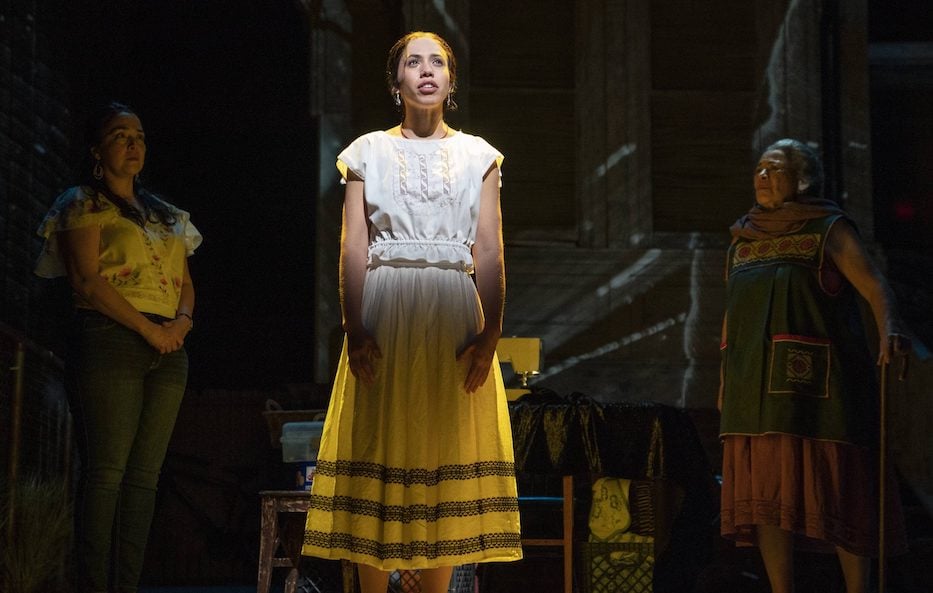
Culture & Community | Education & Youth | Arts & Culture | Will Power! | Yale Rep Theatre | Arts & Anti-racism
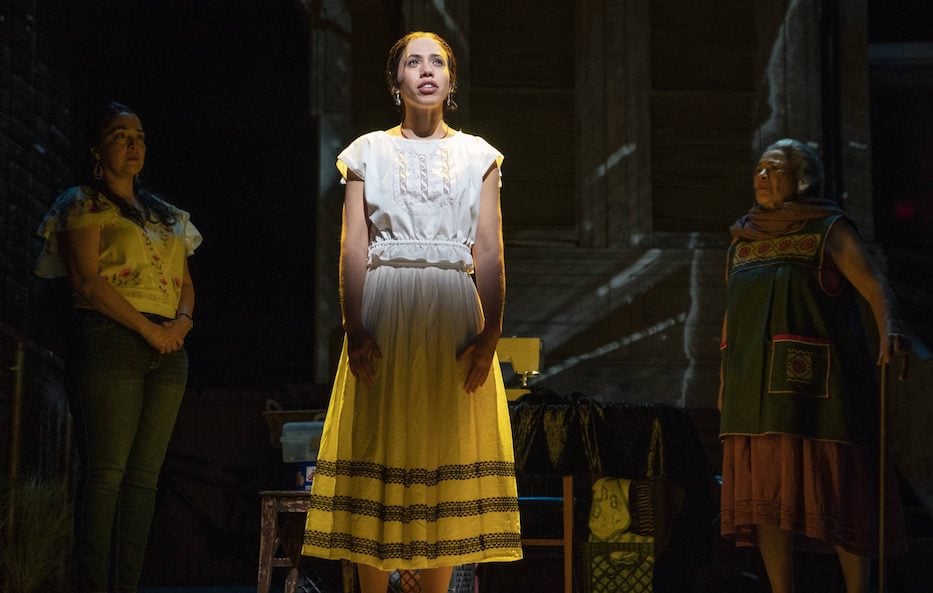
Camila Moreno (front) with Nancy Rodríguez and Alma Martinez in a scene from MOJADA: A MEDEA IN LOS ANGELES by Luis Alfaro, directed by Laurie Woolery. Yale Repertory Theatre, March 10-April 1, 2023. Photo © Joan Marcus.
Medea was full of light. Over the rooftops of Boyle Heights, she glowed, folds of fabric enveloping her. Beneath her, Hason was discovering the limp body of his son, a stain of blood making its way across the floor. His cries filled the space. For a moment, it seemed like the house was breathing with him.
In the audience, New Haven Academy freshman Laksmi Rivera watched, spellbound. Medea flew skyward, her voice transformed to birdsong, and Rivera’s synapses crackled. A single word flashed across her mind: Brujería. She moved forward in her seat, and listened as a stilled silence fell over the theater, followed by an explosion of applause.
Welcome to “Will Power!” an educational program of the Yale Repertory Theatre that brings New Haven high school and adult students into the space. For the first time since 2019, New Haven Public Schools students were able to come back into the theater last week for Mojada: A Medea In Los Angeles. The work, by Mexican American playwright Luis Alfaro, sets Euripides’ Medea in present-day Boyle Heights, a neighborhood east of the Los Angeles river.
The program was suspended from 2020 through 2022 due to Yale’s Covid-19 protocols, which barred school groups from seeing work at the theater. Read about pre-pandemic Will Power! programs here and here.
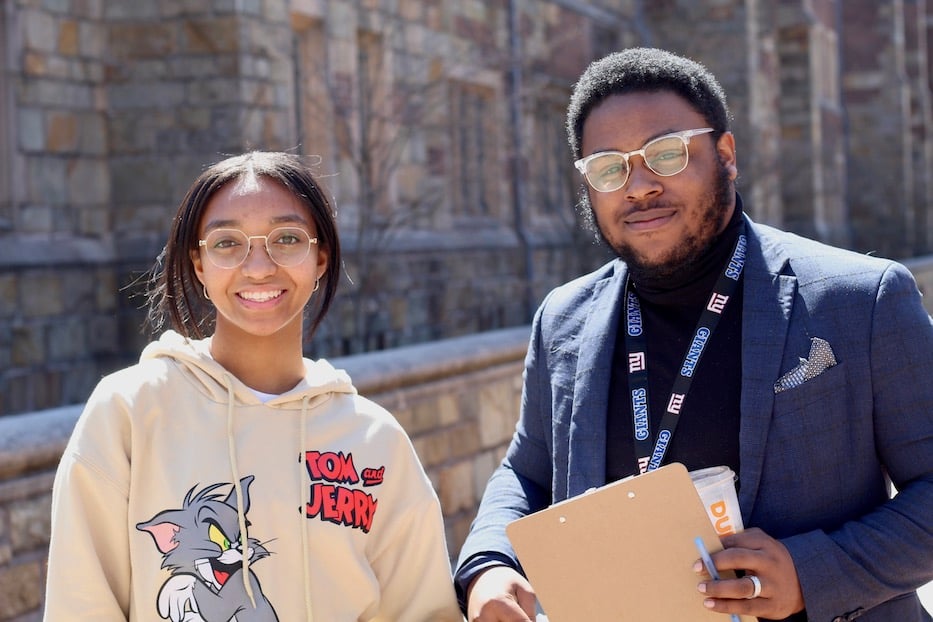
New Haven Academy Freshman Laksmi Rivera and theater teacher Ty Scurry.
“We really focused on getting kids and teachers here,” said Amy Boratko, senior artistic producer at the Rep. She added that the theater has worked to make the program completely free. “We did a lot of thinking about what should be offered, what work would speak to New Haven students.” In a sanctuary city and a school district that is plurality Latino, where immigration narratives are part of New Haven’s story, Mojada stood out.
Premiered a decade ago at Victory Gardens Theatre in Chicago, Mojada follows Medea (a breathtaking Camila Moreno), Hason (Alejandro Hernández), and Tita (Alma Martinez) as they work to build a life in Los Angeles’ Boyle Heights neighborhood. They and their young son Acan (Romar Fernandez) have fled their home in Michoacán, Mexico, in a journey that includes trauma, survivor’s guilt, and a tug-of-war between old and new, tradition and self-erasure. Along the way, characters from Hason’s seductress-boss (Mónica Sánchez as Armida) and pan dulce vendor Josefina (Nancy Rodríguez) add layers—and questions around who is family, and who is not—to the story.
If the storyline sounds timeless, that’s because it is. In Euripides’ Medea, the titular enchantress lives with her husband Jason not in L.A. but in Corinth, to which they have been exiled for his theft of the Golden Fleece. Despite his relationship and two children with Medea, Jason marries Glauce, the daughter of King Creon, in his dogged pursuit of power. Medea, in a calculated rage, kills her sons and rides off in a chariot of flame, grace à her grandfather Helios, a.k.a. the sun.
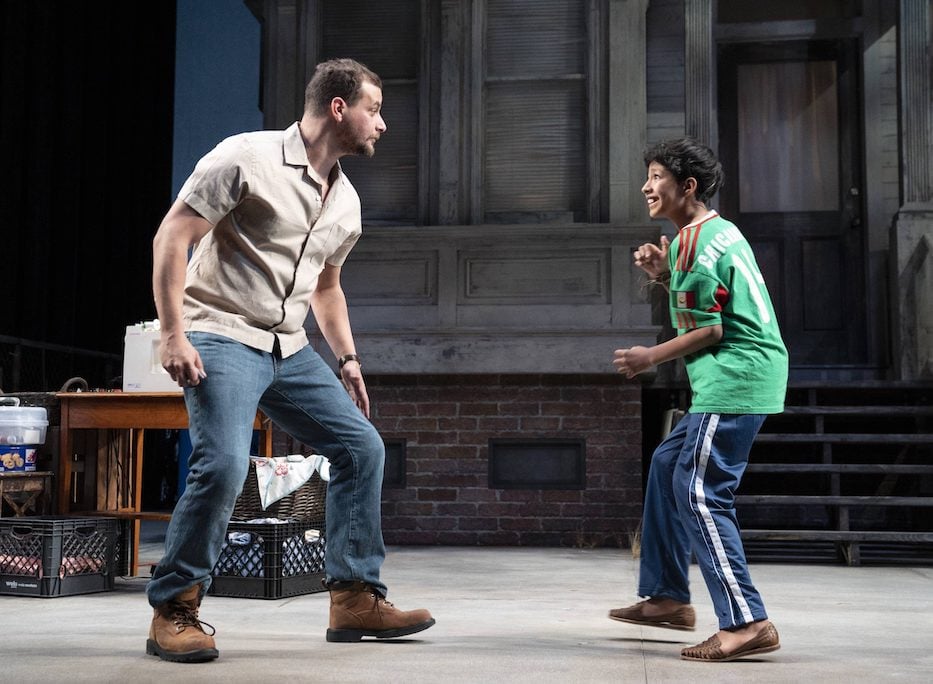
Alejandro Hernández and Romar Fernandez in a scene from MOJADA: A MEDEA IN LOS ANGELES by Luis Alfaro, directed by Laurie Woolery. Yale Repertory Theatre, March 10-April 1, 2023. Photo © Joan Marcus.
Transplanted onto Los Angeles, their story is a story of so many newcomers to this country. They have fled their home because of violence and poverty that the U.S. is quick to deplore, but slow to acknowledge the imperialist and extractive roots of. At home, Medea is forever hunched over a sewing machine, turning out meticulous cuffs and collars that will turn a profit she will never see. She and Hason work doggedly to make ends meet, but are up against a society that wants them to scrimp, scramble, and beg for scraps.
No wonder, then, that Hason is rewarded for his blind material ambition and Medea is penalized for holding fast to Indigenous tradition, legacy, and homeland—even though it is her superpower. Isn’t that the American way? Aren’t they supposed to erase their roots in the never-ending aspiration to whiteness? Isn’t that what the founding fathers wanted when they made stolen people cultivate a country on stolen land?
In setting it in Boyle Heights, which people may recognize from contemporary cultural texts like Gentefied and Vida, Alfaro has made it a biting and trenchant critique of late-stage capitalism and the violent idea of America itself. In this sense, it is very much an L.A. story, but also a New Haven story, where immigrant narratives include histories of wage theft, unsafe working conditions, a loss of home and family that can be a constant ache—as well as humor, tight-knit community, and hard-fought joy.
As Rivera entered the theater last week, she didn’t know what to expect. She looked up at the stage, a character in itself with a raked floor, wood-frame house, and tall metal posts meant to show the height of a border wall between the U.S. and Mexico (a nod to scenic designer Marcelo Martínez García). In her hands, a program mapped out the 1120-mile journey from Michoacán to Los Angeles, a trek that can turn deadly. Last year alone, the Missing Migrants Project reported that 1,434 known migrants died in the Americas and Caribbean.
Since 2014—one year after the work first premiered—that number has climbed to over 7,500. Data from U.S. Border Patrol shows that the number of people trying to cross without documentation has climbed sharply in the past several years, as violence has escalated across in their home countries.
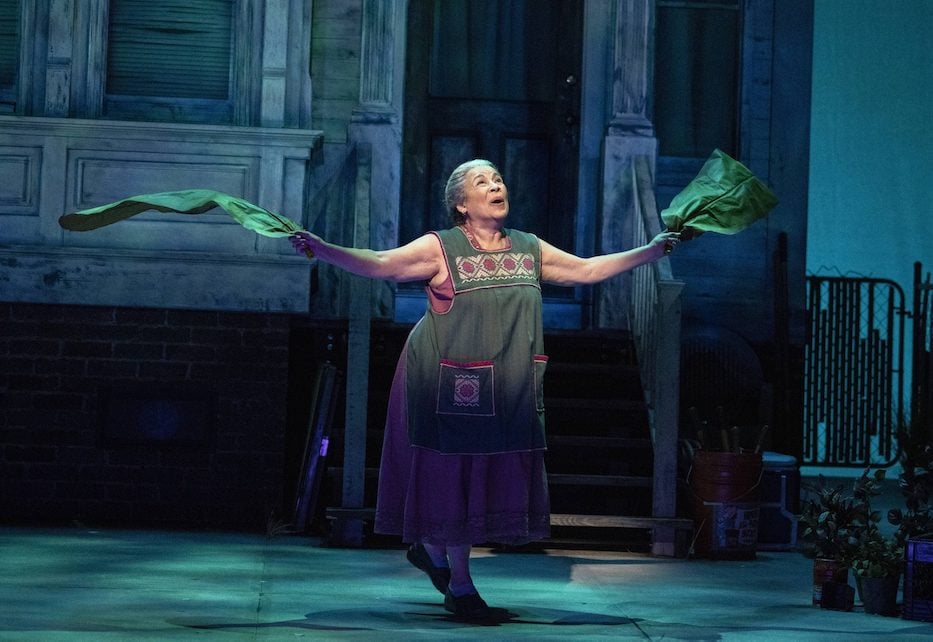
Alma Martinez in a scene from MOJADA: A MEDEA IN LOS ANGELES by Luis Alfaro, directed by Laurie Woolery. Yale Repertory Theatre, March 10-April 1, 2023. Photo © Joan Marcus.
Back in the theater, chatter rose around Rivera as the lights came down, and Tita moved her aging body slowly through the chain-link gate to the family’s home. On stage, she lifted two banana leaves past her shoulders, the forms extending like wings as she whispered in Nahuatl. The wing-leaves rose, and she cleaved apart time and space. The wind shifted. A baby cried. Day and night turned upside down. Then the elements stilled, and it was just L.A. again.
From her seat, Rivera thought about the film Encanto—how the Casa Madrigal heaves and hums with the family’s magic. She wondered: Was this brujería? Was this healing? Did it live somewhere in between?
Onstage, characters were just beginning to tell that story. In an embroidered, white cotton dress, Moreno swept into the space, carrying with her a basket of fabric, and heavy secrets from home. Acan ambled down the stairs, weighing the difference between “Papi” and “Dad” on his tongue when Hason returned. Lighting designer Stephen Strawbridge and projection designer Shawn Lovell-Boyle worked their magic, turning the old house into a place with shadow lives, that existed between universes and centuries.
Everywhere, the title of the show hung low in the air, bridging past and present, ancient Greece and contemporary L.A., the system that exists and the system that could be. It was in Hason’s feverish pursuit of resources, and slow unraveling as new shoes became a new car became a new wife. It was in the Californiacation of Acan, whose proximity to whiteness was measured in fitted beanies and soccer jerseys. It was in Rodríguez’ extended hand when she shrugged off her name for simply “Josie,” and described the backbreaking contours of her workday.
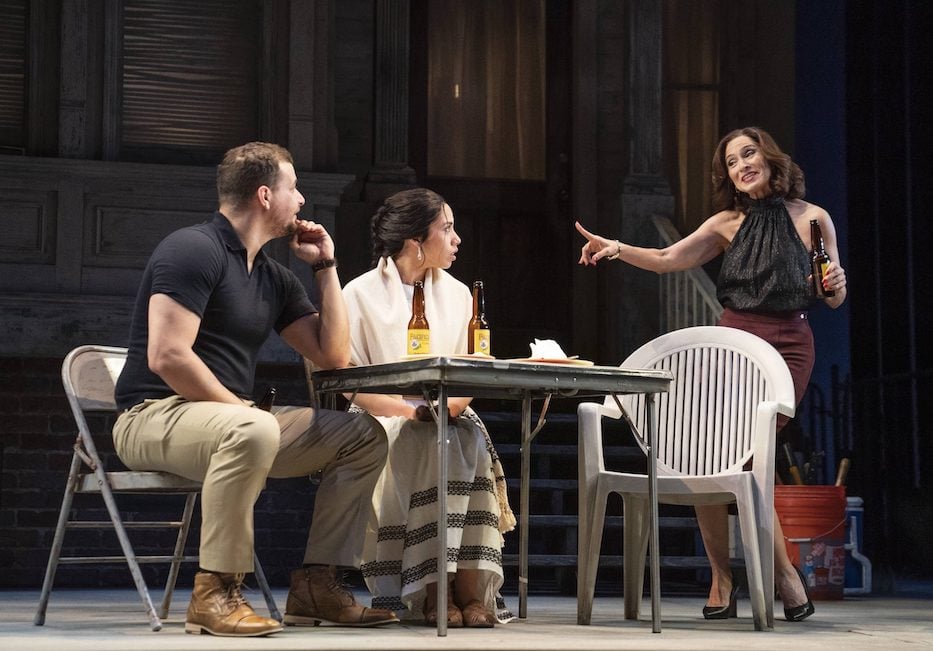
Alejandro Hernández , Camila Moreno, Mónica Sánchez, and Alma Martinez in a scene from MOJADA: A MEDEA IN LOS ANGELES by Luis Alfaro, directed by Laurie Woolery. Yale Repertory Theatre, March 10-April 1, 2023. Photo © Joan Marcus.
Later, It was in Armida’s offer to grant Medea a sewing shop, followed by a reminder that she could own anything she wanted to, including Hason and Acan (a nod to Sánchez, who plays a sleek but surprisingly redemptive villain). Or in Tita’s quiet humor and moxie, a kind of medicine that dovetails with her role as a curandera, or healer. Around Rivera, attendees began responding to the play, talking back to the actors as they dug deeper into this world.
But it was Moreno, speaking even when she was not, who lent the work its ferocity and a furious, sometimes racing heartbeat. For the titular character, Alfaro’s Medea has relatively few lines, and does in gesture, movement, and rhythm what she does not in words. For just over 90 minutes, Moreno harnessed the power of silence and sound, saying everything she needed to in the space and breath between lines.
“The opportunity to dive in an explore other lives is to me a gift in my opinion,” she later said during a talkback.
For Rivera, it made the rising action and the ending shocking, and maybe not shocking at all. Before she rises above the stage, a larger-than-life version of el Guaco, Medea walks back into the house she rents with Hason, and kills her son. For someone who knows the source text, it’s a foregone conclusion. But for this Medea, who exists both within and independent of the myth, it’s also an act of horror and mercy: she believes she is saving this child from the United States.
It’s a moment when an audience member has to grapple with a country in which they are complicit in and sustained by migrant labor in ways that they can’t even fathom. That avocado from breakfast? It may have come from Michoacán, which exports 80 percent of its annual crop to the U.S. That dress from Urban Outfitters? Try exhausted and underpaid garment workers from L.A. to Malaysia. That new apartment building downtown? The hospital rooms scrubbed clean in the midst of a pandemic? Hands that have been asked to remain invisible.
Back in the theater, Rivera watched as Moreno looked over the audience, a fiery resolve in her eyes. She listened as Fernandez’ questioning, his little boy cries filled the air, turned to mewling, and fell quiet just as quickly. When the lights came up, she was still thinking about it. “It was uncalled for, some of the things that happened. But it was very interesting,” she said.
She later added that she was still processing. During a talkback with several of the actors and production dramaturg Sebastián Eddowes-Vargas, her hand shot up, waiting for the mic. When Boratko’s attention fell on her, she asked what she thought was a simple question: Is Medea a witch? She began to flow between English and Spanish, a nod to her Dominican family.
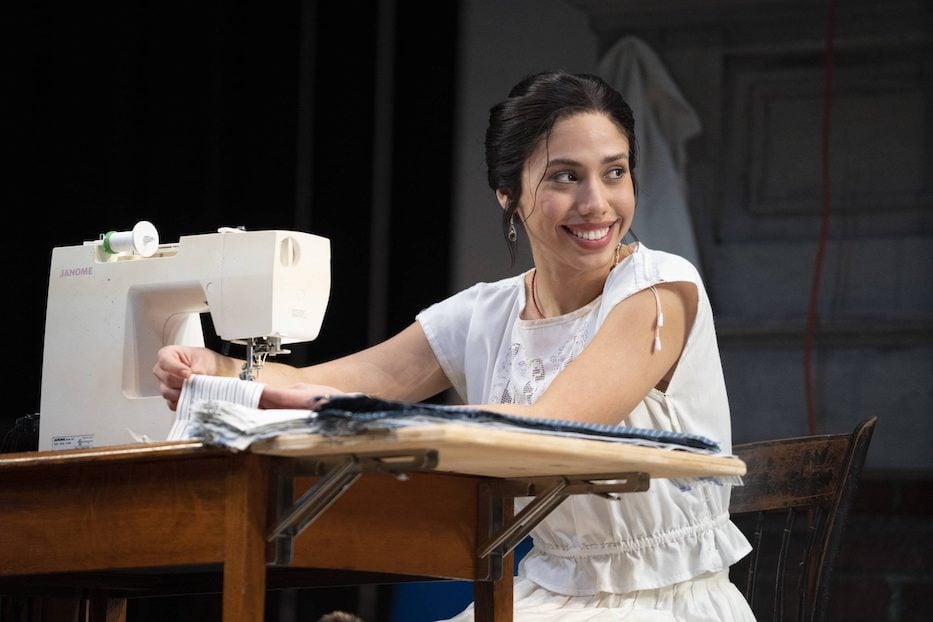
Camila Moreno in a scene from MOJADA: A MEDEA IN LOS ANGELES by Luis Alfaro, directed by Laurie Woolery. Yale Repertory Theatre, March 10-April 1, 2023. Photo © Joan Marcus.
Moreno leaned forward, her face aglow. “What do you think?” she offered. Down the same row of chairs, Eddowes-Vargas pointed to an earlier version of Mojada that was titled Bruja. Rivera took a beat, and then ventured that witchcraft is part of the story.
“This is a play that talks about the criminalization of people,” Eddowes-Vargas said of the show, bristling at the term “illegal” even as he used it in scare quotes. “People who are treated as criminals but who benefit nationals.”
Rivera was still thinking about the question minutes later, as New Haven Academy students spilled back into the sunlight and headed toward their school bus. An aspiring Olympian, she said that she doesn’t often see theater, but was grateful for the chance.
She said that the ending was still fresh in her mind—it reminded her of customs that don’t feel so far away from her Dominican upbringing. She said that she is super proud of her heritage, including seeing her lived experience reflected onstage.
“In my head, I'm thinking, just like Encanto, the movie, all of those like … the moving house and the fact that she turned into a bird, those are all related to like, how Hispanics are, like. some of them do Brujería,” she said. “So I’m thinking that’s why they would incorporate that.”
“I thought it was a really good show,” she added.

